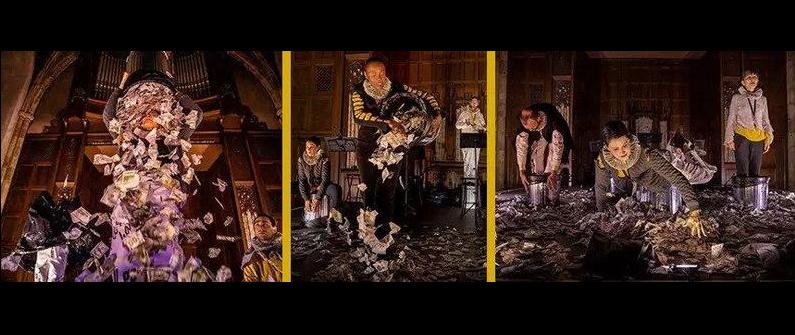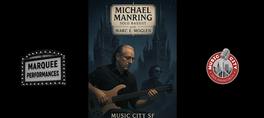Sat September 9, 2023
The Merchant of Venice (Annotated) or In Sooth I Know Not Why I Am So Sad
SEE EVENT DETAILS
What can a play from sixteenth century England tell us about how antisemitism and other prejudicial beliefs operate in our world today? What perceived truths does a play reveal about the society in which it was created, and what ideas within that society does it reinforce?
William Shakespeare likely wrote The Merchant of Venice between 1596 and 1598, only a few years after the plague had temporarily closed London's theaters. This was a period of great uncertainty in English society, with ongoing conflicts taking their toll, concerns about the government's stability under an aging leader, and significant economic stresses. The anxieties associated with these societal pressures can perhaps be seen in Merchant" in its portrayal of Shylock, the Jewish moneylender.
Bringing together elements of Merchant with Elizabethan history and news from the 21st century, The Merchant of Venice (Annotated), or In Sooth I Know Not Why I Am So Sad takes a kaleidoscopic view of the ways in which members of a society displace their fears on the "other" during times of upheaval.
About theatre dybbuk
theatre dybbuk creates provocative new works that blend physical theatre with poetry and music for exciting, utterly singular live events. The company explores the rich world of Jewish history, building lyrical performances that illuminate universal human experience for contemporary audiences. With an in-depth development process that can range from a few months to three years, Artistic Director Aaron Henne builds each piece with a cast of dedicated professional actors, designers, musicians and scholars. The resulting works, from the dark and visceral dance theatre of cave... a dance for Lilith to the shadowy and immersive hell prepared: a ritual exorcism inspired by kabbalistic principles, performed within a dominant cultural context, are challenging and beautiful to behold.
$30-$40.
Presented by The Oshman Family JCC
show less
William Shakespeare likely wrote The Merchant of Venice between 1596 and 1598, only a few years after the plague had temporarily closed London's theaters. This was a period of great uncertainty in English society, with ongoing conflicts taking their toll, concerns about the government's stability under an aging leader, and significant economic stresses. The anxieties associated with these societal pressures can perhaps be seen in Merchant" in its portrayal of Shylock, the Jewish moneylender.
Bringing together elements of Merchant with Elizabethan history and news from the 21st century, The Merchant of Venice (Annotated), or In Sooth I Know Not Why I Am So Sad takes a kaleidoscopic view of the ways in which members of a society displace their fears on the "other" during times of upheaval.
About theatre dybbuk
theatre dybbuk creates provocative new works that blend physical theatre with poetry and music for exciting, utterly singular live events. The company explores the rich world of Jewish history, building lyrical performances that illuminate universal human experience for contemporary audiences. With an in-depth development process that can range from a few months to three years, Artistic Director Aaron Henne builds each piece with a cast of dedicated professional actors, designers, musicians and scholars. The resulting works, from the dark and visceral dance theatre of cave... a dance for Lilith to the shadowy and immersive hell prepared: a ritual exorcism inspired by kabbalistic principles, performed within a dominant cultural context, are challenging and beautiful to behold.
$30-$40.
Presented by The Oshman Family JCC
What can a play from sixteenth century England tell us about how antisemitism and other prejudicial beliefs operate in our world today? What perceived truths does a play reveal about the society in which it was created, and what ideas within that society does it reinforce?
William Shakespeare likely wrote The Merchant of Venice between 1596 and 1598, only a few years after the plague had temporarily closed London's theaters. This was a period of great uncertainty in English society, with ongoing conflicts taking their toll, concerns about the government's stability under an aging leader, and significant economic stresses. The anxieties associated with these societal pressures can perhaps be seen in Merchant" in its portrayal of Shylock, the Jewish moneylender.
Bringing together elements of Merchant with Elizabethan history and news from the 21st century, The Merchant of Venice (Annotated), or In Sooth I Know Not Why I Am So Sad takes a kaleidoscopic view of the ways in which members of a society displace their fears on the "other" during times of upheaval.
About theatre dybbuk
theatre dybbuk creates provocative new works that blend physical theatre with poetry and music for exciting, utterly singular live events. The company explores the rich world of Jewish history, building lyrical performances that illuminate universal human experience for contemporary audiences. With an in-depth development process that can range from a few months to three years, Artistic Director Aaron Henne builds each piece with a cast of dedicated professional actors, designers, musicians and scholars. The resulting works, from the dark and visceral dance theatre of cave... a dance for Lilith to the shadowy and immersive hell prepared: a ritual exorcism inspired by kabbalistic principles, performed within a dominant cultural context, are challenging and beautiful to behold.
$30-$40.
Presented by The Oshman Family JCC
read more
William Shakespeare likely wrote The Merchant of Venice between 1596 and 1598, only a few years after the plague had temporarily closed London's theaters. This was a period of great uncertainty in English society, with ongoing conflicts taking their toll, concerns about the government's stability under an aging leader, and significant economic stresses. The anxieties associated with these societal pressures can perhaps be seen in Merchant" in its portrayal of Shylock, the Jewish moneylender.
Bringing together elements of Merchant with Elizabethan history and news from the 21st century, The Merchant of Venice (Annotated), or In Sooth I Know Not Why I Am So Sad takes a kaleidoscopic view of the ways in which members of a society displace their fears on the "other" during times of upheaval.
About theatre dybbuk
theatre dybbuk creates provocative new works that blend physical theatre with poetry and music for exciting, utterly singular live events. The company explores the rich world of Jewish history, building lyrical performances that illuminate universal human experience for contemporary audiences. With an in-depth development process that can range from a few months to three years, Artistic Director Aaron Henne builds each piece with a cast of dedicated professional actors, designers, musicians and scholars. The resulting works, from the dark and visceral dance theatre of cave... a dance for Lilith to the shadowy and immersive hell prepared: a ritual exorcism inspired by kabbalistic principles, performed within a dominant cultural context, are challenging and beautiful to behold.
$30-$40.
Presented by The Oshman Family JCC
show less
Date/Times:
3921 Fabian Way , Palo Alto, CA 94303
The Best Events
Every Week in Your Inbox
From Our Sponsors
UPCOMING EVENTS
Great suggestion! We'll be in touch.
Event reviewed successfully.









